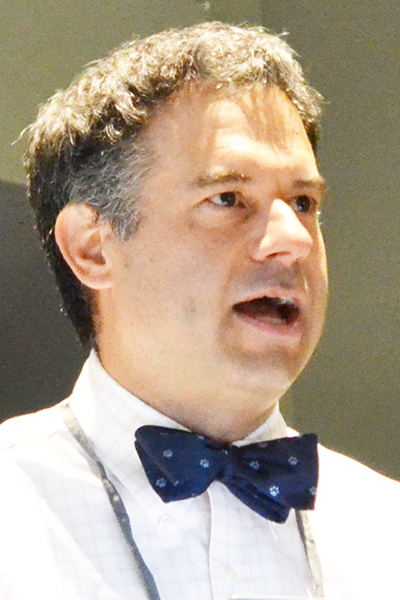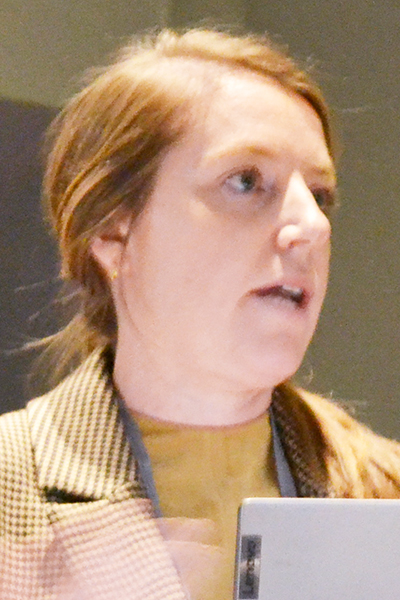For decades, advanced practice providers (APPs) have provided high-quality and cost-effective care in ICU units. However, specific roles can vary widely across institutions, and challenges remain with burnout, effective billing, procedural competency evaluation, and other critical aspects of APP work.
Panelists in the CHEST 2025 session The Benefits of APPs Working With Physicians in the ICU shared their experiences for effectively leveraging APP skills and strengths on Sunday, October 19, in Chicago.

The presence of APPs in ICUs has become increasingly common in the United States since the 1960s, said Session Chair William Bender, MD, MPH, Associate Professor in the Department of Medicine at Emory University and the Medical Director of MSICU at Emory Saint Joseph’s Hospital. He pointed to a recent study showing that APPs worked in nearly 4 out of every 5 adult ICUs in the US health care system.
The effectiveness of APPs—including nurse practitioners (NPs), physician assistants/associates (PAs), and others—has been persistently reported in studies gauging patient results, such as the length of stay, mortality rates, readmission rates, and other factors. Panelist Radu Postelnicu, MD, FCCP, highlighted a sedation practice study showing that ICUs with APPs had shorter times to extubation.

“This time to extubation is important because that means we can get our patients off the vent quicker, work with them through physical therapy, and get them to recover much quicker instead of keeping them longer—all ways to improve their outcomes,” said Dr. Postelnicu, Assistant Professor of Medicine at NYU Grossman School of Medicine and the Director of Clinical Innovation and Critical Care at Bellevue Hospital.
APPs play an important role as local experts in their units, preserving and passing on institutional culture and procedures in the daily continuity of care, Dr. Bender noted.
“Surgeons love continuity,” he said. “They love familiar faces. They love being able to rely on people they know, so the APP who lives in that unit is probably going to have a bit more street cred with a surgeon.”

The contributions of APPs should be reflected in the ICU’s billing records, said Caitlin ten Lohuis, ACNP-BC, MSN, Critical Care Advanced Practice Provider at Emory St. Joseph’s Hospital and Associate Director for the Satellite Trials Group of Emory. She noted that billing for APP work, like other critical care billing, is measured in time units and must be clearly linked to the provider who provided the bulk of care for any billed procedure or contact.
She said that having MDs and APPs bill together on a shared unit—called the split/shared billing model—required higher staffing expenses and precise documentation but supported a fair reimbursement and the mission of an ICU.
“Not only does split/shared billing increase revenue, there is a lot of literature… that adding APPs to a unit alleviates the workload for intensivists in a busy ICU and improves patient care outcomes,” ten Lohuis said.

In order to be the most effective ICU team members, APPs must gain and maintain procedural competency, said Nathan Thornton, DNP, AGA-CNP, Assistant Professor of Medicine and Supervisor of Medical ICU and Respiratory Care Unit Advanced Practice Providers at Mayo Clinic, Rochester.
Because of a lack of national guidelines for teaching and assessing procedures in NP or PA programs, Dr. Thornton said, institutions must step into the void.
“Structured onboarding is becoming crucial,” he said. “This is a recommended three to six months, including didactic simulation and supervision through that period.”
Once an APP is effectively trained to institutional standards, they should be supported to avoid skill decay, Dr. Thornton said. This is complicated by the dearth of studies and data showing the best approach in preserving procedural competency, he said, but pointed to practices in his and other institutions where skills are assessed on an annual basis.
Institutions should also support APPs through compensation, promotion, and professional growth beyond the ICU to help avoid burnout, the panelists said. This allows APPs to come into the ICU and focus on what they do best as an effective member of their multidisciplinary team, able to improve lives and help educate the next generation of intensivists. “Going forward, APPs should unequivocally be considered part of an effective multidisciplinary critical care education effort,” Dr. Bender said.

Call for Topics Is Open
Feeling inspired by all the great sessions in Chicago? Help shape the curriculum for CHEST 2026, October 18 to 21 in Phoenix, by submitting topic ideas from areas you’re passionate about, topics affecting your practice, or new technologies you’d like to learn more about. The submission deadline is Tuesday, December 2, at 2 pm CT.


